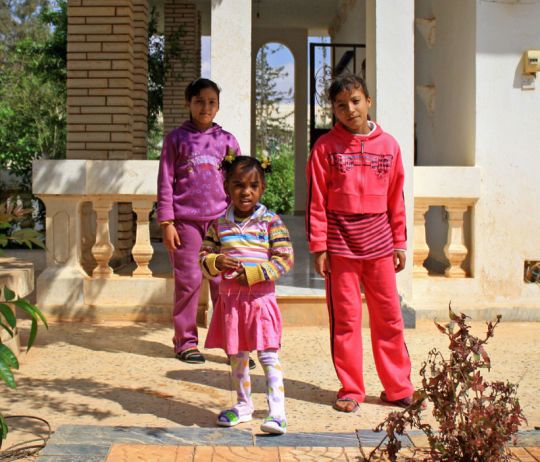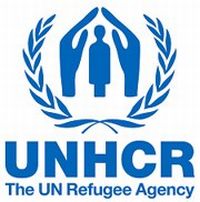Child refugees from Libyan crisis in Norway for UN resettlement process
Child refugees from Libyan crisis in Norway for UN resettlement process
 Displaced children from Ajdabiya play in the grounds of a converted construction camp in Benghazi, Libya. Photo: OCHA
Displaced children from Ajdabiya play in the grounds of a converted construction camp in Benghazi, Libya. Photo: OCHA
A group of 33 unaccompanied children who spent months in a refugee camp in Tunisia after fleeing last year’s turmoil in Libya have arrived in Norway for a resettlement process spearheaded by the United Nations High Commissioner for Refugees (UNHCR).
The children, who left for Norway on Sunday, were among 90 youngsters who arrived in Tunisia from Libya unaccompanied, with some having lost their parents or were separated during their flight from the chaos that engulfed Libya during the military campaign to oust the regime of Muammar al-Qadhafi.
Most of the children are originally from Somalia, Sudan, Ethiopia or Eritrea, UNHCR spokesperson Adrian Edwards told reporters in Geneva.
They have been staying in Tunisia’s Choucha camp, which is home to 3,400 refugees. The children had relied on help from friends and relatives, as well as local and international aid workers. In total, 39 of the 90 children have now been resettled – mostly in Norway, Sweden and Denmark.
“As they had formed strong bonds among each other, the departure has been painful for many of them – not least those still awaiting resettlement,” said Mr. Edwards. “Life at Choucha camp remains difficult, with windswept conditions and bitter cold. UNHCR and its partners hope that solutions can quickly be found for the unaccompanied children who remain there – as well as for the other refugees who await solutions.”
UNHCR is providing assistance at Choucha and works with the children and their communities to establish the best interests of each child. The International Organization for Migration (IOM) provides child-friendly orientation and arranges transportation to new homes. It arranged the weekend flight to Norway.
Mr. Edwards stressed that UNHCR considers resettlement to be the only viable option for the majority of recognized refugees who fled Libya to Tunisia and Egypt last year. UNHCR and IOM have urged States, especially European countries, to offer more resettlement places for the refugees still remaining at the borders of Egypt and Tunisia.
The UN agency has completed refugee status determination for all 2,500 applicants in Choucha camp and 2,200 have been recognized as refugees. When an additional 800 people who were recognized as refugees in Libya before the unrest are included, the total number of refugees in need of resettlement rises to more than 3,000.
Meanwhile, at Egypt’s Saloum border crossing from Libya, around 1,400 of the 1,830 refugees there have also sought resettlement.
Resettlement referrals for both residents of Choucha and Saloum have been submitted and accepted by Australia, Belgium, Canada, Denmark, Finland, Ireland, the Netherlands, Norway, Portugal, Sweden and the United States. Most recently, Germany, New Zealand and Spain have joined the resettlement effort by planning to send selection missions to the two camps.
###
About the Office of the United Nations High Commissioner for Refugees (UNHCR)

The Office of the United Nations High Commissioner for Refugees was established on December 14, 1950 by the United Nations General Assembly. The agency is mandated to lead and co-ordinate international action to protect refugees and resolve refugee problems worldwide. Its primary purpose is to safeguard the rights and well-being of refugees. It strives to ensure that everyone can exercise the right to seek asylum and find safe refuge in another State, with the option to return home voluntarily, integrate locally or to resettle in a third country. It also has a mandate to help stateless people.
In more than six decades, the agency has helped tens of millions of people restart their lives.
Today, a staff of some 7,685 people in more than 125 countries continues to help some 33.9 million persons.
###
> United Nations (UN).
 The United Nations was established on 24 October 1945 by 51 countries committed to preserving peace through international cooperation and collective security. Today, nearly every nation in the world belongs to the UN: membership totals 192 countries.
The United Nations was established on 24 October 1945 by 51 countries committed to preserving peace through international cooperation and collective security. Today, nearly every nation in the world belongs to the UN: membership totals 192 countries.
When States become Members of the United Nations, they agree to accept the obligations of the UN Charter, an international treaty that sets out basic principles of international relations. According to the Charter, the UN has four purposes:
- to maintain international peace and security;
- to develop friendly relations among nations;
- to cooperate in solving international problems and in promoting respect for human rights;
- and to be a centre for harmonizing the actions of nations.
###
* The above story is adapted from materials provided by United Nations (UN)
** More information at United Nations (UN)



















